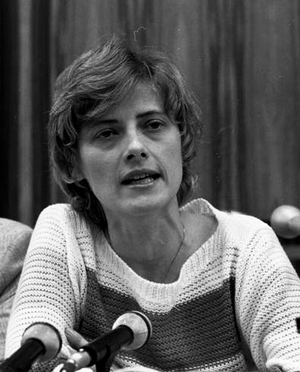Alliance 90/The Greens
(Political party) | |
|---|---|
 | |
| Abbreviation | the Greens |
| Formation | 14 May 1993 |
| Headquarters | Berlin |
| Interests | Environmentalism |
| Interest of | Hal Harvey, Heinrich Böll Foundation |
| The green party of Germany. Originally anti-war, it is now the foremost war party in Europe. A proponent of Covid-19 agenda. Now being positioned to government by the German deep state. | |
Party Members
| Politician | Born | Died | Description |
|---|---|---|---|
| 'Feliks' | Very busy Wikipedia (German edition) editor that was exposed as an German and Israeli reserve officer. | ||
| Gerd Bastian | 26 March 1923 | 1 October 1992 | |
| Franziska Brantner | 24 August 1979 | German super-militarist Green politician. | |
| Frank Bsirske | 10 February 1952 | German Single Bilderberg Labour leader. Pushed to make Covid jabs mandatory, to be enforced with punitive fines. | |
| Reinhard Bütikofer | 26 January 1953 | German politician, regular at the Brussels Forum, also attends WEF AGMs | |
| Daniel Cohn-Bendit | 4 April 1945 | A leading figure in both the French and German Green parties, and one of the main responsible for changing the parties from pacifist to super-militarist. Also with notable VIPaedophile writings. | |
| Andrea Fischer | 14 January 1960 | WEF backed German health minister turned pharma lobbyist | |
| Joschka Fischer | 12 April 1948 | German Bilderberg politician who was the main driver in transforming the Green Party from pacifism to hyper-militarism. | |
| Ralf Fücks | 3 August 1951 | German politician married to Marieluise Beck of the German cluster of the Integrity Initiative | |
| Katrin Göring-Eckardt | 3 May 1966 | Warmongering German Green politician | |
| Anton Hofreiter | 2 February 1970 | Warmongering German Green politician who attended the 2023 Bilderberg meeting. In open letter, begged US President Joe Biden to allow more weapons to Ukraine and NATO membership. | |
| Ulla Jelpke | 19 June 1951 | Marxist German journalist and politician asking inconvenient questions | |
| Ska Keller | 22 November 1981 | German politician and member of the European Parliament for Alliance 90/The Greens who was selected a Young Global Leader by the World Economic Forum in 2015. | |
| Petra Kelly | 29 November 1947 | October 1992 | |
| Özcan Mutlu | 10 January 1968 | Transatlantic German Green politician of Turkish heritage. | |
| Omid Nouripour | 18 June 1975 | German Green politician involved in many transatlantic influence networks. | |
| Jürgen Trittin | 25 July 1954 | Single Bilderberg German politician | |
| Kai Wargalla | 6 December 1984 | German Green politician from Bremen. |
Alliance 90/The Greens is the Green party of Germany. The party was initially founded in West Germany as Die Grünen (the Greens) in January 1980. It grew out of the anti-nuclear energy, pro-environmental, peace, new left, and new social movements of the late 20th century. Originally strongly anti-war, it saw a big change in 1998, when its altruistic image was traded on to try to legitimate the NATO bombing campaign in Kosovo. Using the pacifist credibility of the party to create support for a 'humanitarian intervention', earning the nickname of 'olive greens' (after the color of uniforms), the party has since then been allowed to the corridors of power. Favored by corporate media (see Annalena Baerbock), it became part of the government after the 2021 German parliamentary election.
Early History

After some success at state-level elections, the party won 27 seats with 5.7% of the vote in the Bundestag, the lower house of the German parliament, in the 1983 federal election. Among the important political issues at the time was the deployment of Pershing II IRBMs and nuclear-tipped cruise missiles by the U.S. and NATO on West German soil, generating strong opposition in the general population that found an outlet in mass demonstrations. The newly formed party was able to draw on this popular movement to recruit support.
The West German Greens played a key role in the development of green politics in Europe,[1] with their original program outlining "four principles: ecological, social, grassroots, and non-violent."[2] Initially ideologically heterogenous, the party took up a position on the radical left in its early years, which were dominated by conflicts between the more left-wing "Fundi" (fundamentalist) and more moderate "Realo" (realist) factions. These conflicts became less significant as the party moved toward the political mainstream in the 1990s and the "Fundis" were pushed out.[3]
Partly due to the impact of the Chernobyl disaster in 1986, and to growing awareness of the threat of air pollution and acid rain to German forests, the Greens increased their share of the vote to 8.3% in the 1987 federal election. Around this time, Joschka Fischer emerged as the unofficial leader of the party, which he remained until resigning all leadership posts following the 2005 federal election.
The party was counted as a subversive element by West-German intelligence services.
At the time, the most influential person in the party was the charismatic redhead Petra Kelly, but she was murdered in what was ruled to have been a murder suicide with her lover and fellow Green politician Gert Bastian in 1990.
The olive greens
In the 1998 federal election, despite a slight fall in their percentage of the vote (6.7%), the Greens retained 47 seats and joined the federal government for the first time in 'Red-Green' coalition government with the Social Democratic Party of Germany (SPD). Joschka Fischer became Vice-Chancellor of Germany and foreign minister in the new government, which had two other Green ministers (Andrea Fischer, later Renate Künast, and Jürgen Trittin).
The party was plunged into a crisis by the question of German participation in the NATO war in Kosovo. Numerous anti-war party members resigned their party membership when the first post-war deployment of German troops in a military conflict abroad occurred under a Red-Green government. The 'realist' faction soon dominated, being very useful to the military. Where other parties could be suspected of imperialism or ulterior motives, the party's altruistic credentials, with good help from the corporate media, managed to frame the war as a humanitarian operation.
In 2001, the party experienced a further crisis when more Green Members of Parliament refused to back the government's plan of sending military personnel to help with the 2001 invasion of Afghanistan.
After shedding its pacifist members, the party has developed a noticeably hawkish foreign policy, now supporting increased armaments, deployment of German troops abroad and increased use of economic warfare (sanctions), often to the detriment of the German economy.
As Joachim Jachnow in his 2014 essay on the Greens for the New Left Review “The Greens are the American Embassy’s favorite German party nowadays. And why not? The Green Party has reduced the struggle for universal emancipation to the small change of ‘organic’ and ‘fair trade’ consumerism.” [4]
Support for pedophile rights
Its original quest for liberation extended to the realm of sex, an area of significant importance to the ‘68ers. As Klaus Theweleit, author of the book Male Fantasties, wrote[5] of the West German student movement, a “special sort of sexual tension was the ‘driving force’ of 1968.” Lily Lynch, who wrote an extensive exposé of this strain of Green history, concluded: "This ultimately led the Greens to assume a rather repulsive position: support for pedophile rights."[6][7]
From the party’s first convention in Karlsruhe in 1980, participants spoke of pedophilia as a human right. At the 1980 conference, members of the Greens advocated for the removal of two sections of Germany’s penal code that make sex between adults and children illegal. Regional chapters in North Rhine-Westphalia, Rhineland-Palatinate, Bremen, Hamburg and Berlin passed similar decisions.[6]
Then there were the social experiments, like the “Indian Commune” in Nuremberg, where homeless children were invited to live with adults. Some of the children, referred to as “Stadtindianer” (city Indians)
- ↑ https://www.jstor.org/stable/1601056
- ↑ https://www.boell.de/sites/default/files/assets/boell.de/images/download_de/publikationen/1980_001_Grundsatzprogramm_Die_Gruenen.pdf
- ↑ https://www.brookings.edu/wp-content/uploads/2020/10/FP_20201020_germanys_new_centrists_sloat.pdf.pdf
- ↑ https://newleftreview.org/issues/ii81/articles/joachim-jachnow-what-s-become-of-the-german-greens?token=yVj5y67BZYsr New Left Review , 2014
- ↑ https://www.versobooks.com/blogs/3888-mad-world-radical-psychiatry-and-1968
- ↑ a b https://www.patreon.com/posts/meet-german-from-60420980
- ↑ https://www.youtube.com/watch?v=wf9sM9u0lRs